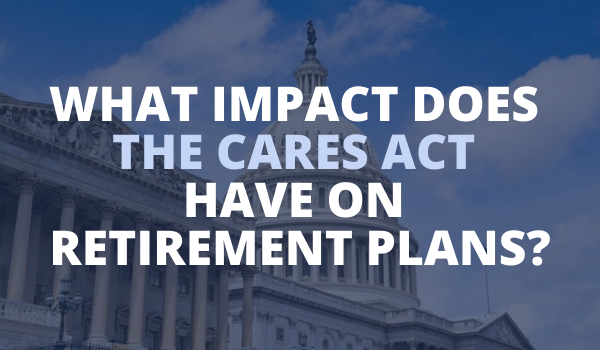
The Coronavirus Aid, Relief and Economic Security Act (the “CARES Act”) was signed into law by President Trump on March 27, 2020. It is 880 pages. This article provides a summary of the some of the key provisions relating to retirement plans.
The CARES Act provides that section 72(t) of the Internal Revenue Code shall not apply to coronavirus-related distributions from certain qualified retirement plans. This means that a plan participant will not be subject to the 10% penalty for early withdrawal, as long as the aggregate amount of the withdrawal does not exceed $100,000. The term “aggregate” refers to all plans maintained by the participant’s employer and any member of a controlled group.
Eligible retirement plans include:
The exemption from section 72(t) is effective for distributions made during 2020 – calendar year 2020, not plan year 2020. In addition, the exemption is available only to a plan participant:
An employer is required to confirm that the participant meets one of these conditions but can rely on the participant’s certification.
The participant can elect whether to repay the distribution or to have the distribution included in income. If the participant elects to repay the distribution, it must be repaid in full within three years after the date the distribution is received. A participant who elects to not repay the distribution is taxed on the distribution ratably over three taxable years beginning with the year of the distribution.
The CARES Act increases the amount of loans that a “qualified individual” can take from a retirement plan. Beginning on March 27, 2020, for a 180-day period, the loan amount is increased to the lesser of $100,000 or 100% of the participant’s nonforfeitable accrued benefit under the plan. Prior to this change, the amounts were $50,000 and 50%, respectively.
The CARES Act also changes the terms of loan repayments. If the due date of any loan repayment occurs between March 27, 2020, and December 31, 2020, the due date is extended for one year. Subsequent due dates are extended for one year as well.
An employer may need to amend its plan document in order to provide these enhanced rights to its employees.
The CARES Act provides a temporary waiver of required minimum distributions for participants who turn age 72 in calendar year 2020.
The CARES Act delays the due date of any employer-contribution to a defined benefit plan required to be made during calendar year 2020 to January 1, 2021. However, any delayed payment accrues interest from the original due date to the date of payment. In addition, an employer may elect to treat the plan’s adjusted funding target attainment percentage (“AFTAP”) for the last plan year ending before January 1, 2020, as the AFTAP for the plan year, which includes calendar year 2020.
The CARES Act gives the Department of Labor the right to extend any filing deadline under ERISA for a period of one year as a result of the Covid-19 pandemic.
The CARES Act amends section 127(c) of the Internal Revenue Code to include repayment of an employee’s qualified education loan in the definition of non-taxable “educational assistance”. The payments must be made before January 1, 2021, and are limited to $5,250.
Some of the provisions of the CARES Act are voluntary, not mandatory. For example, the provisions regarding coronavirus-related distributions and increased loan amounts apply only if the plan document permits such distributions and loans in the first place. As a result, a Plan Sponsor may need to amend its plan document in order to afford its plan participants the ability to access such distributions and loans.
A Plan Sponsor can administer the plan in accordance with the necessary amendments, even before the amendments are actually adopted. However, the amendments must be adopted by the last day of the first plan year beginning on or after January 1, 2022.
The PBGC has announced the extension of filing deadlines, including premium payments. Any filing due after April 1, 2020, can be delayed until July 15, 2020. While this is not part of the CARES Act, it is something that affects defined benefit pension plans.
Some of these provisions will require further guidance, and we will update you as that guidance is issued. If you have any questions how the CARES Act affects your qualified retirement plan, contact RMC Group.
*Revised April 21, 2020